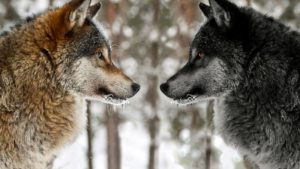The Story of Two Wolves
An old Cherokee is teaching his grandson about life. “A fight is going on inside me,” he said to the boy. “It is a terrible fight and it is between two wolves. One is evil – he is anger, envy, sorrow, regret, greed, arrogance, self-pity, guilt, resentment, inferiority, lies, false pride, superiority, and ego.”
He continued, “The other is good – he is joy, peace, love, hope, serenity, humility, kindness, benevolence, empathy, generosity, truth, compassion, and faith. The same fight is going on inside you – and inside every other person, too.”
The grandson thought about it for a minute and then asked his grandfather, “Which wolf will win?”
The old Cherokee simply replied, “The one you feed.”
This story is multilayered with many implications regarding human nature, psychology, free will and even the intentional focus inherent in mindfulness. However, at a most primary level, this story is an example of the basic tenets of cognitive behavioral therapy, CBT. CBT posits that our thoughts affect how we feel and what we do. For example, if I forget to complete an assignment, I might think that I am irresponsible which in turn would lead me to feel of sad, inferior and angry. In response to these negative feelings, I might experience a period of immobilization being able to complete the tardy assignment. On the other hand, if in response to forgetting an assignment, I think that given my unusually busy schedule it is understandable that I forgot my assignment, which I can complete at a slightly later date. In response to these more positive feelings, I am likely to feel more at peace and satisfied.
In terms of the story of the two wolves, the evil wolf represents that aspect of negativity that all of us manifest at some time. The negative emotions of anger, envy, inferiority, false pride, etc. are born of correspondent negative thoughts that give rise to these problematic emotions. The good wolf represents that aspect of positivity found in the emotions of empathy, kindness, hope and compassion which are rooted in positive thoughts. So, when negative thoughts are generated and maintained over time, negative feeling states such as anger, envy and despair will occur more often. Conversely, when positive thoughts are generated and maintained, positive feeling states, such as peace, love and happiness will occur more often. Thus, in order to increase positive emotions (and over all well-being) and/or reduce negative emotions, we must intentionally feed to “good wolf”. CBT provides techniques for feeding the good wolf by providing strategies to challenge and replace negative thoughts with positive, self-enhancing ones. Learning CBT is not difficult. Many therapists are CBT trained and there are numerous self-help resources in book form and online.
Submitted by Holly O. Houston, Ph.D.
